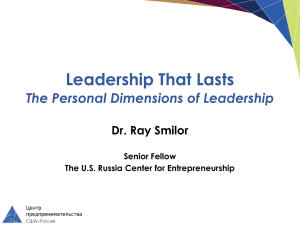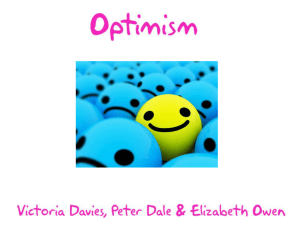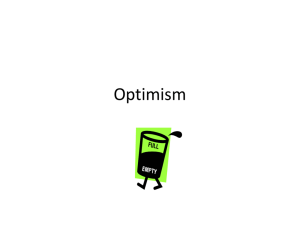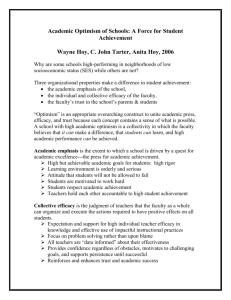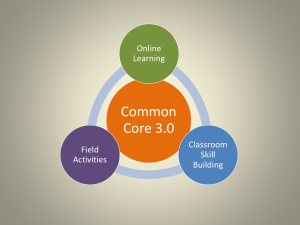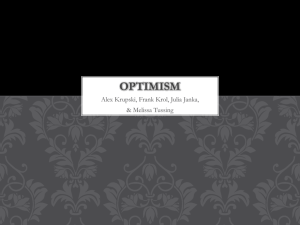Q U I C K S T A...
advertisement
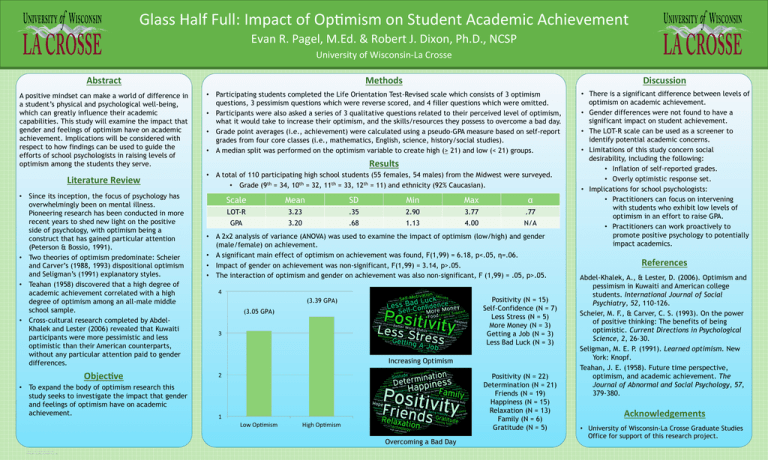
Glass Half Full: Impact of Op/mism on Student Academic Achievement Evan R. Pagel, M.Ed. & Robert J. Dixon, Ph.D., NCSP University of Wisconsin-­‐La Crosse Abstract Methods Discussion A positive mindset can make a world of difference in a student’s physical and psychological well-being, which can greatly influence their academic capabilities. This study will examine the impact that gender and feelings of optimism have on academic achievement. Implications will be considered with respect to how findings can be used to guide the efforts of school psychologists in raising levels of optimism among the students they serve. • Participating students completed the Life Orientation Test-Revised scale which consists of 3 optimism questions, 3 pessimism questions which were reverse scored, and 4 filler questions which were omitted. • Participants were also asked a series of 3 qualitative questions related to their perceived level of optimism, what it would take to increase their optimism, and the skills/resources they possess to overcome a bad day. • Grade point averages (i.e., achievement) were calculated using a pseudo-GPA measure based on self-report grades from four core classes (i.e., mathematics, English, science, history/social studies). • A median split was performed on the optimism variable to create high (> 21) and low (< 21) groups. • There is a significant difference between levels of optimism on academic achievement. • Gender differences were not found to have a significant impact on student achievement. • The LOT-R scale can be used as a screener to identify potential academic concerns. • Limitations of this study concern social desirability, including the following: • Inflation of self-reported grades. • Overly optimistic response set. • Implications for school psychologists: • Practitioners can focus on intervening with students who exhibit low levels of optimism in an effort to raise GPA. • Practitioners can work proactively to promote positive psychology to potentially impact academics. Literature Review • Since its inception, the focus of psychology has overwhelmingly been on mental illness. Pioneering research has been conducted in more recent years to shed new light on the positive side of psychology, with optimism being a construct that has gained particular attention (Peterson & Bossio, 1991). • Two theories of optimism predominate: Scheier and Carver’s (1988, 1993) dispositional optimism and Seligman’s (1991) explanatory styles. • Teahan (1958) discovered that a high degree of academic achievement correlated with a high degree of optimism among an all-male middle school sample. • Cross-cultural research completed by AbdelKhalek and Lester (2006) revealed that Kuwaiti participants were more pessimistic and less optimistic than their American counterparts, without any particular attention paid to gender differences. Objec>ve • To expand the body of optimism research this study seeks to investigate the impact that gender and feelings of optimism have on academic achievement. Results • A total of 110 participating high school students (55 females, 54 males) from the Midwest were surveyed. • Grade (9th = 34, 10th = 32, 11th = 33, 12th = 11) and ethnicity (92% Caucasian). Scale Mean SD Min Max α LOT-R 3.23 .35 2.90 3.77 .77 GPA 3.20 .68 1.13 4.00 N/A • A 2x2 analysis of variance (ANOVA) was used to examine the impact of optimism (low/high) and gender (male/female) on achievement. • A significant main effect of optimism on achievement was found, F(1,99) = 6.18, p<.05, η=.06. • Impact of gender on achievement was non-significant, F(1,99) = 3.14, p>.05. • The interaction of optimism and gender on achievement was also non-significant, F (1,99) = .05, p>.05. 4 Positivity (N = 15) Self-Confidence (N = 7) Less Stress (N = 5) More Money (N = 3) Getting a Job (N = 3) Less Bad Luck (N = 3) (3.39 GPA) (3.05 GPA) 3 Increasing Optimism 2 Positivity (N = 22) Determination (N = 21) Friends (N = 19) Happiness (N = 15) Relaxation (N = 13) Family (N = 6) Gratitude (N = 5) 1 Low Op/mism High Op/mism Overcoming a Bad Day RESEARCH POSTER PRESENTATION DESIGN © 2012 www.PosterPresentations.com References Abdel-Khalek, A., & Lester, D. (2006). Optimism and pessimism in Kuwaiti and American college students. International Journal of Social Psychiatry, 52, 110-126. Scheier, M. F., & Carver, C. S. (1993). On the power of positive thinking: The benefits of being optimistic. Current Directions in Psychological Science, 2, 26-30. Seligman, M. E. P. (1991). Learned optimism. New York: Knopf. Teahan, J. E. (1958). Future time perspective, optimism, and academic achievement. The Journal of Abnormal and Social Psychology, 57, 379-380. Acknowledgements • University of Wisconsin-La Crosse Graduate Studies Office for support of this research project.
